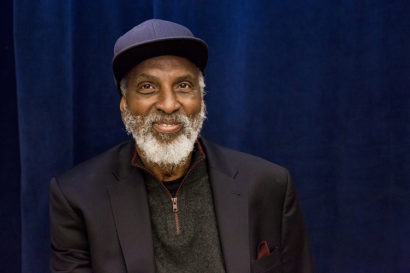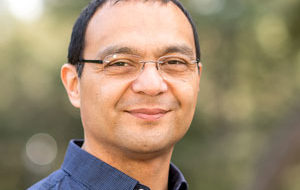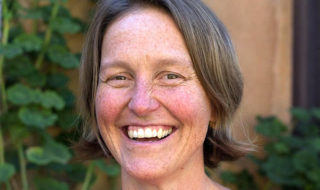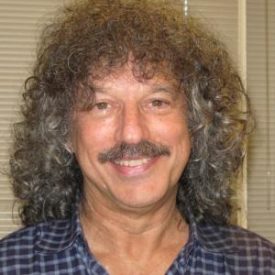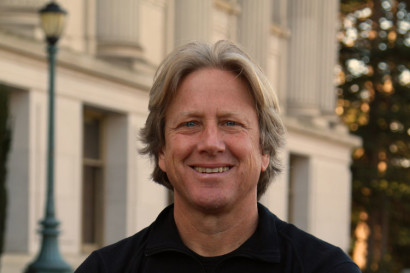Reasons to be hopeful, optimistic and maybe even cheerful in 2022
UC Berkeley scholars and staff share what gives them hope in the new year, despite formidable challenges
January 18, 2022

Peggy Lemaux, a professor of cooperative extension in crop genetics, at UC Berkeley’s Oxford Tract Research Facility. Lemaux studies the development of nutritious, robust, and resilient staple crops to feed the world. (Photo by Jim Block)
The year 2021 was spectacularly tough: raging COVID-19 variants, extreme weather catastrophes, voter suppression efforts, racial injustice, income inequality, mass homelessness and housing instability, a bleak economic outlook. Yet, UC Berkeley scholars, students and staff recently offered reasons not to lose hope for the future — on campus, around the globe and all the way in outer space.
Peggy Lemaux, professor of cooperative extension in crop genetics
Students care about our future food supply
“I grew up on a farm. So, I appreciate how hard it is to put food on the table. But I wasn’t sure those around me had the same perspective. I think, or at least hope, the COVID-19 pandemic has led most people to take the food on their table less for granted. I am hopeful that students being trained to do plant research and communicate about its importance will also be more appreciated as we move into 2022. These students invest their time in learning more about what makes plants drought-tolerant, what helps them become more disease-resistant, how to get them to sequester more carbon in the soil or how to get microbes to help plants survive harsh environmental conditions. These are all issues students are tackling with their research. While not magic bullets, these efforts can lead to improvements and get more young people involved in ensuring our future food supply. And this is critical to our planet moving forward. With hopes for more appreciation for agricultural research and for the young people who are being trained to lead us in these efforts in 2022.”
Jeff Selbin, Chancellor’s Clinical Professor of Law
 Campus efforts move the needle on debt-free justice
Campus efforts move the needle on debt-free justice
“In spite of the many challenges and hardships in 2021, UC Berkeley’s Policy Advocacy Clinic staff, students, and partners helped to move the needle on racial and economic justice, providing legal and advocacy support to pass juvenile fee abolition bills in five states and an adult fee repeal bill in California. In addition to curtailing the collection of burdensome fees in the state’s criminal legal system, these legislative victories relieved millions of low-income and disproportionately Black, Latinx, and Indigenous families of more than $16 billion in regressive and racially discriminatory debt. In addition to our state and local abolition work, UC Berkeley’s law and public policy students partnered with groups across the country and political spectrum on several major initiatives, including launching a Debt-Free Justice campaign to end monetary sanctions in the juvenile legal system, urging the U.S. Department of Justice to issue guidance supporting the repeal of juvenile fees and fines, and intervening in a significant fines-and-fees case in the Idaho Supreme Court, which ruled unanimously to prohibit judges from issuing arrest warrants for failure to pay court fines and fees before establishing a defendant’s ability to pay. All these efforts on the part of our students give me hope.”
Robin Lakoff, professor emerita of linguistics
 Biden’s tone is more forceful
Biden’s tone is more forceful
“Since he received the Democratic presidential nomination, there has been only one word that typifies President Joe Biden, and that word is ‘decent.’ There is only one thing wrong with decency: it’s boring. Its rhetorical opposite is what you get from the Previous Guy, and of course we ought to loathe the Previous Guy’s’ impropriety as much as we love the Current Guy’s decency. But we don’t. Americans, even the most avid of Trump-haters, are addicted to Trump’s rhetoric. We remember it, and we even — sort of — savor it. Yes, I do and you do, too. We prick up our ears when he comes on TV, and we remember what he says and quote it. Yes, you do. But until very recently, none of us remembered anything Biden said. It was true. It was right. It was decent, and therefore eminently forgettable. But Biden’s Jan. 6, 2022 speech was not decent. It was fierce, it was passionate, it was forceful. It also happens to have been true, but that’s irrelevant. If Biden and his speechwriters can keep it up, there will be reason for hope, for November 2022 and 2024.”

President Joe Biden makes speech on Jan. 6, 2022, the anniversary of the Capitol Riot. (Pool photo by Getty Images North America)
Shani Shay, graduating senior and director of Berkeley’s Incarceration to College program
Work and research that breeds a sense of belonging
“There are many things I am not optimistic about. But what I see now — and what I look forward to this year and in the future — is the inability for white supremacy to prevail. It’s virtually impossible, given the amount of people of color and allies that there are now.
I look forward to seeing people of color in different spaces and in positions of power, changing the paradigm of the status quo in a tangible way that goes beyond conversation and theory. To show us what it would be like to have different people in different places, innovating in different and unique ways.
I am a still discouraged about Black people ever being placed on common ground and having the same opportunities as the rest of Americans, but I feel as though the combination of new technologies and the pandemic has changed the way the workforce will operate. As a graduating senior this semester, I’m hopeful for what those new jobs will look like in a new job market that is hopefully more inclusive.
On campus, there are many Black and brown people right here at Berkeley that don’t feel welcomed. While I am not sure this will ever change, I am optimistic that some changes are being made, but not as fast as some of us want. I’m not sure that we’ll really ever have true diversity, equity and inclusion at Berkeley, but I’m optimistic about the information coming from researchers on campus that could help.
As founder and director of UC Berkeley’s Incarceration to College program, I have focused on teaching life skills classes that expose opportunities and resources to students who were arrested and are in Contra Costa and Alameda county jails and juvenile halls. I want to give them a pipeline to higher education. I hope to expand that program, but also go to grad school to pursue a master’s degree in education. I can’t wait to have my degree and be out in the world to use it in a positive way!”
Stephen Hinshaw, professor of psychology
The stigma of mental illness is gradually receding
“Although public knowledge about various mental and neurodevelopmental disorders increased markedly over the past half-century, public attitudes have hardly budged. In fact, such attitudes have worsened in key ways. For example, the belief that mental illness is inevitably linked to violence has actually more than doubled. On a positive note, recent findings by Indiana University sociologist Bernice Pescosolido and colleagues, published last month in JAMA Network Open, are encouraging. Through national-level data, they found that attitudes toward depression have shown a real improvement, the first noted over the past quarter century. Specifically, the general public did not reveal the same kinds of ‘social distance’ (i.e., wanting to be removed from people with major depression) so often voiced. At the same time, more members of the public than before viewed many forms of mental illness as actual diseases, not simply signs of weak personal will. Crucially, younger people appear to be driving the improved attitudes of late. The strong suggestion is that efforts to reach teens and young adults, a major feature of efforts at Berkeley and throughout the UC system, will continue the positive momentum. That gives me hope.”
Travis Bristol, associate professor of education
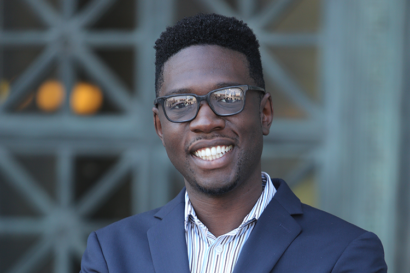 A new appreciation for schools and the complexities of teaching
A new appreciation for schools and the complexities of teaching
“I’m optimistic about how our country is coming to understand that the role of schools isn’t solely about teaching children, but that schools serve multiple functions, as demonstrated by the challenges during the COVID-19 pandemic. For example, schools are places where children who do not have enough to eat can have access to at least two meals a day. Also, children who are in spaces that are unhealthy for them, socially and emotionally, can find safety at school, if the school is organized and resourced properly. I’m optimistic that adults both in and outside of education, by dint of having engaged in the homeschooling process during the pandemic, better understand the complexity of teaching and learning. Many parents experienced, while homeschooling their children, that they did not have the tools or skills to teach their child because teaching — like flying a plane — is a profession that involves complex tasks. So, I’m optimistic that we as a country are understanding the importance of providing teachers with high-quality preparation so that they can continue to train our country’s next generation, and that we need to invest more in our schools. Policies from the federal government and the California Department of Education’s Educator Effectiveness Block Grant have placed significant resources in schools because of this clear demonstration that schools serve multiple purposes. Those are the things that lead me to feel really optimistic about 2022.”
Liwei Lin, professor of mechanical engineering
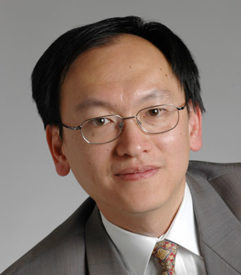 Engineering lab developed a rapid COVID-19 diagnosis
Engineering lab developed a rapid COVID-19 diagnosis
“The COVID-19 pandemic has devastated our lives over the past two years. Globally, scientists, doctors, nurses and delivery groups have worked around the clock to combat the virus. Scientists have conducted groundbreaking research on different aspects of this pandemic, from diagnostic methods to vaccine development. Having access to a reliable, simple and rapid testing method at home is crucial for allowing people to check their health regularly and quarantine themselves, if necessary. What gives me hope is that my mechanical engineering lab at UC Berkeley has developed a new diagnosis method for SARS-CoV-2 detection. We are using colloidal nanoplasmonic gold nanoparticles to detect low concentrations of the virus in just five minutes. Our technology is based on localized surface plasmon. Positive cases turn the solution from red to blue by aggregating gold nanoparticles. To test for the virus at home, people can simply dip their nasal swab into a detector solution and check the color change at home. This is a good reason to be hopeful about the future as we become more prepared to combat future pandemics.”
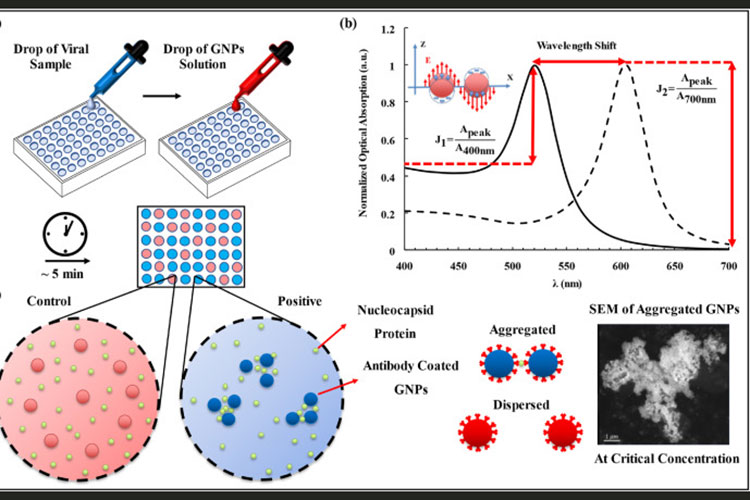
Liwei Lin and colleagues are working on a new rapid diagnostic method for COVID-19 that changes color within minutes when low concentrations of the virus are detected. (Image courtesy of Liwei Lin)
G. Cristina Mora, associate professor of sociology
 Commitment to increasing Hispanic, Latinx representation on campus
Commitment to increasing Hispanic, Latinx representation on campus
“As we head into 2022, I am feeling so very hopeful about the campus energy around UC Berkeley’s transition to a Hispanic-Serving Institution (HSI), a federal designation that requires at least 25% of the undergraduate population to be Hispanic/Latinx. In 2017, Chancellor Carol Christ set this goal for 2027 and already I see so much positive momentum. Dania Matos, vice chancellor for equity and inclusion, has taken the issue up masterfully, assembling a team that includes some of the campus’s most committed staff members. Last year, the HSI task force of staff, students and faculty volunteered endless hours to flesh out Chancellor Christ’s vision, and have produced one of the UC system’s most comprehensive HSI blueprint reports. As the head of the Latinx and Democracy Cluster, I have personally witnessed the campus commit funding and resources to the future of Chicanx/Latinx studies on campus. To be sure, there is still much to be done. For starters, the campus needs to assure the necessary resources to move us into the HSI implementation stage. Just as importantly, the UC Berkeley community needs to contend with a campus climate that has engendered the severe underrepresentation of Latinx students, staff and faculty. As we head into a new year, though, I have so much hope. I see the energy. I see the allyship. Given the opportunity, our HSI effort will courageously re-imagine the promise of higher education, and will ensure the integrity of our public mission for generations to come.”
Adrian Aguilera, associate professor of social welfare
 Pandemic trauma also can build resilience
Pandemic trauma also can build resilience
“The collective trauma of the pandemic has been harsh and has led to an exacerbation of individual and social ills. It’s crucial to acknowledge and reflect on those, particularly on the way they have been unevenly distributed in our society. As happens during challenging times, many have also developed increased flexibility, acceptance and resiliency. These are key factors in achieving positive mental health. Living through surges and changing guidelines has surely been frustrating for all, and experiencing these changes has made us realize what we are grateful for in life. We, and those in charge, have not been perfect in their decision-making, and we know that failures are necessary to learn and improve. It may take time for us to notice, but I am hopeful that we can come out of these difficulties stronger and more resilient, individually and collectively. In my work as a therapist, I have met people who have gone through some of the worst experiences one can imagine. Many of those same people are also the strongest I can think of because of how they used those experiences to realize their strengths. The story that we tell ourselves about these times will help determine who we become. How have you been resilient?”
Deirdre Mulligan, professor in the School of Information
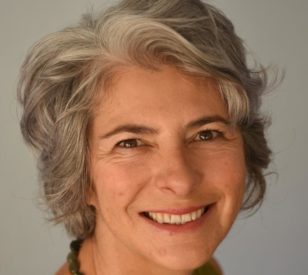
Student’s project helps us get closer to nature
“The San Francisco Bay Area is home to a vast network of hiking trails, beaches and green spaces. Using the citizen science app iNaturalist, which originated as a 2008 master’s (degree) final project by I-School students Jessica Kline, Ken-ichi Ueda and Nathan Agrin, people can learn about local flora and fauna and contribute observations from your hikes, runs and picnics in the park with a growing community interested in the natural world. That makes me feel optimistic about our enduring connection to nature.”

Coastal redwoods in Sonoma County, California. (Photo by Yasmin Anwar)
john powell, professor of law and of African American studies
The company we keep and engage with
“These are very strange and difficult times. We keep looking for something to be upbeat about in the midst of glaring bad news. For me, I have lost too many friends. The country and the world no longer seem to turn, but to wobble. Hate and polarization seem to be growing and are even institutionalized. So, you might be wondering where is the hope. Hold on, I will get to that.
People often ask: Is it the journey or the destination? Well, I suggest it is the company we keep. I have some pretty amazing company. People full of life and love for themselves and all the other selves, including the planet. I don’t ascribe to superpowers, but if I did, it would be these folks. So, what I find in this group is love and belonging, but not necessarily hope. But here is my story of hope: I am not inclined to spend much time and energy on hope. But neither do I hang out very much with despair. I believe life is to be lived, and living entails the company we keep and engage with. As we are engaged, we don’t know really where we are in terms of how things will turn out for the short and certainly for the long run.
But we are not passive. What we do, how we do it — and certainly who we do it with — matters. I am fortunate to have wonderful folks to be and do with. There are things I am concerned about: our democracy, the people, the planet itself, my family and friends, you. If I were to try to put this into hope, I would say it all comes from engagement and the larger and deeper engagement with each other. Let’s stay engaged.”
Dan Weisz, associate professor of astronomy
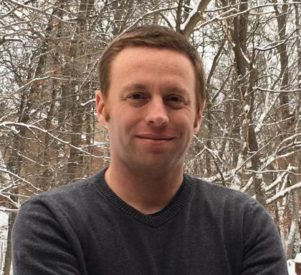 Launch of NASA’s James Webb Space Telescope
Launch of NASA’s James Webb Space Telescope
“What a beautiful Christmas gift to have NASA’s long-awaited James Webb Space Telescope launch without a hitch on December 25. A lot of astronomers breathed a sigh of relief at the success of a $10 billion, multidecade effort to put a telescope with a 21-foot mirror into space. The successor to the Hubble Space Telescope, this new telescope is designed to probe the very early universe. The first part of the year we’ll get the telescope up to speed and commissioned, and in early summer and fall we’ll start observing and then publishing a slew of papers about the first results. The whole of 2022 is going to be a Webb extravaganza.”

Artist conception of the James Webb Space Telescope. (Credit: NASA GSFC/CIL/Adriana Manrique Gutierrez)
Rodolfo Mendoza-Denton, professor of psychology
The magical universality of stories
I am profoundly grateful for stories. The formats vary: short stories to novels; TV shows to movies. Regardless of the format, stories are vehicles both of escape and approach: They can take us away from reality while simultaneously allowing us to reflect on various aspects of that reality. Stories are also tools of disengagement and focus. We relax at the end of a long day with a good story, but that can lead to a focus so intense that nothing else seems to matter. They allow us both to feel and understand deeply. And, done right, stories stay with you, full of meaning and wonder long after they’ve been read or seen. The characters I’ve come across during the pandemic have helped me bear the isolation of lockdown; they have been my social life.
My students, friends and family know: I will quote or share seemingly random scenes from movies or books that seem relevant to a particular situation. If I’m unlucky, the reference won’t land. But, sometimes, someone else will know the reference – that exact scene – and laugh. Those are magical moments, when two or more people are sharing in the joy of a common experience, of understanding a point with layers of added meaning that words would not do justice to. In short, they get it, and we share in both experience and understanding. The imaginary characters not only exist in my head, but now also populate my actual social relationships. And we can all be friends. I invite you to meet one of my friends here.
Hannah Stuart, assistant professor of mechanical engineering

Robots are helping us overcome challenges
“Two pioneering projects led by my research team, UC Berkeley’s Embodied Dexterity Group, make me optimistic about the role of robotics in everything from assistive technology to planetary exploration. Ever imagine what it would be like to have an extra limb, like a third arm or a tail? Roboticists build and test such supernumerary devices to explore the boundaries of human ability as they seek collaborative wearable augmentation. Our research team is exploring whether extra fingers could be useful for people with spinal cord injury at the C6-C7 level, which typically results in paralysis of the fingers. In a paper published in the Proceedings of the IEEE International Conference on Robotics and Automation, we present the preliminary results of a promising new device that enables people with tetraplegia to grasp objects.
Meanwhile on Mars, the age of a lone rover is coming to a close. NASA’s Perseverance rover and Ingenuity helicopter are collaboratively exploring the harsh terrain of Mars. Our team is looking into how multiple robots can work together to overcome and manipulate large objects. In a study published in IEEE Robotics and Automation Letters, we released findings that show how robots can interact forcefully with common loose terrains, like sand. We are now working to demonstrate how a team of small robots can move massive loads by working together, even on especially challenging terrains.”
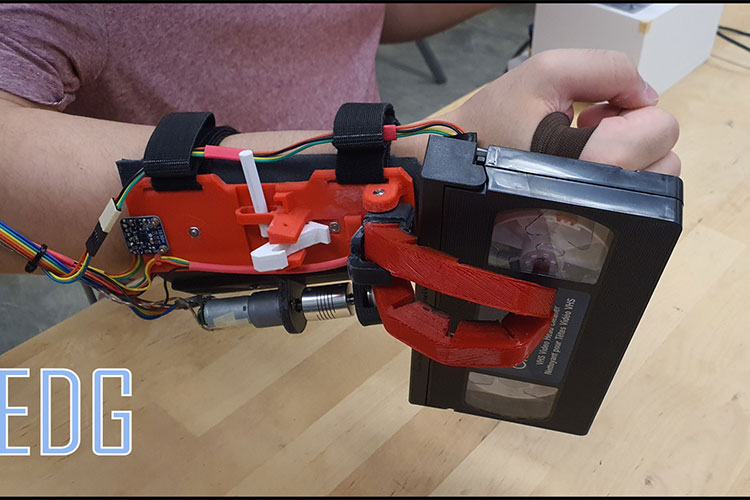
UC Berkeley’s Embodied Dexterity Group, led by Hannah Stuart, is developing a robotic device that could help people with spinal cord injuries and paralysis grasp objects. (Photo courtesy of Hannah Stuart)
Jim Knowlton, director of athletics
 Student-athletes making the world a better place
Student-athletes making the world a better place
“I continue to be inspired by our student-athletes with their optimism and strong desire to make this a better world for everyone. All of this comes despite the impact of COVID-19 on their sports, their school experience and their mental health. For example, in the summer of 2020, with the pandemic raging and our country facing a racial reckoning following the murder of George Floyd, the duo of Cailyn Crocker and Sierra Richey from our women’s basketball program created a Racial Justice Council, using their platform to organize and advocate for an inclusive and anti-racist community. They continue to grow the council’s reach and have set it up for success after they graduate.

Cal football player Elijah Hicks engaged in community service. (Photo courtesy of Cal Athletics)
Cal football player Elijah Hicks created Intercept Poverty, a foundation that helps students overcome financial roadblocks, and has a vision to empower low-income students to focus on school without worrying about financial needs. And our women’s swim team recently partnered with the organization, Team IMPACT, to support a local 6-year-old battling leukemia, making her an honorary team member and clearly bringing her joy, whether in person or online. While these are only a few samples of what our student-athletes are doing, they provide a shining light and give us hope for the next generation of leaders.”
Emiliana Simon-Thomas, science director, Greater Good Science Center
The arts have extraordinary healing powers
“What has been bringing me hope in the past months has been a refocusing on the role of creative and artistic activities and experiences in mental health and well-being. There are several large-scale initiatives supporting rigorous science about how engagement in artistic endeavors — from writing poetry to playing music to painting to watching theater and more — can measurably benefit mental health. A case in point is New York’s Metropolitan Museum Healing Arts event. UC Berkeley’s Greater Good Science Center recently wrote about a study which showed that theater audiences showed greater prosocial characteristics, like empathy and generosity. In other work, more art in life is tied to greater happiness, better mood, sense of shared humanity, and beneficial profiles on biomarkers of health. The momentum toward greater scientific rigor and validation in the field of engagement with arts and implications for well-being, both ameliorating mental health symptoms and promoting positive well-being, seems to be increasing, and again, lends hope to the possibility of systemically reinfusing communities, institutions and societies with more widespread and equitable access to the arts at participatory, performative and reception levels.”

Dancers with the Alvin Ailey American Dance Theater (Photo courtesy of Andrew Eccles)
Robert Levenson, professor of psychology
We’re better prepared for future pandemics
“Behind the storm clouds of COVID’s climbing case rates, cancellations and crises is an explosion of exciting new science and technological developments around virology, vaccine development and rapid testing that could put us in a much better position for dealing with disease outbreaks in the future. Although currently awash in a morass of identity politics, the COVID experience may ultimately stimulate a much-needed revitalization of the nation’s public health resources and greater public awareness of the importance of accurate health data, clinical trials and evidence-based health interventions. We can never forget the devastating effects of COVID. But we should use this as an opportunity to create a future in which we are better prepared, more informed, more aware of our global interdependence, and ready to take full advantage of all that we have experienced and learned.”
Erica “Bree” Rosenblum, professor of global change biology

(Photo by Elena Zhukova)
An endangered frog species returns, students discover their passions
“We are living in an era of profound biodiversity loss, with millions of species threatened with extinction. Amphibians have been hard hit by many stressors — including the spread of infectious disease due to globalization. A particular fungal pathogen has recently spread across the planet, killing frogs in its wake. We have been studying this disease threat in ecosystems around the world, including California. After decades of watching species dwindle, we are now observing a surprising rebound in the iconic mountain yellow-legged frog as it begins to recover in areas of the Sierra Nevada. What allows some species to return from the brink of extinction? And how can we best support biodiversity recovery in an era of rapid change? These are questions that species comebacks allow us to answer. Perhaps a recovering frog species may not feel like big news, but it represents something important. Life is resilient, creative and constantly changing. It’s our job to pay attention and to care. If each person cherished just a single species in addition to our own, we could blanket the tree of life in hope many times over.
Another effort that gives me hope is the Berkeley Discovery Initiative, which prepares students to meet the challenges of our times and provides a roadmap for reimagining undergraduate education. Currently, six trailblazing teams across campus are using their Berkeley Discover Innovation Awards to redesign their programs and offer students a more personalized journey of discovery. They are reaching thousands of students this year alone, with more to come. As an investment in our collective future, Berkeley Discovery is also expanding programs that build a sense of belonging, creating a centralized hub that connects students to their passions, offering financial support to broaden participation and creating forums to showcase students’ ingenuity and courage. In a world where the future can sometimes seem dim, UC Berkeley is providing a beacon of hope for innovation in higher education.”
Chaka Tellem, ASUC president and third-year student
Leadership requires measured optimism
“I’ve always considered myself a glass half-full kind of person. Growing up, I moved around a lot. From Gambia to Texas, my life was defined by persevering through the circumstances presented to me. The optimistic spirit I developed as a way to approach life and its challenges allow me to not only survive, but work to make it a better place. I think optimism is crucial to successful leadership, especially in a time when the pandemic and national turmoil has made many apathetic about our trajectory.
Of course, the key to making progress is not a blind optimism, but the measured belief that we can work together to make change. Having leaders that remain unfazed by the seeming impossibility of our problems is important to uplift the morale of the communities they represent. As ASUC president, I’ve had the pleasure and privilege of getting to engage with the breadth of our campus communities. The pandemic has made it increasingly hard for students to connect with one another in shared spaces, and we continue to suffer the isolating effects of online instruction.
As a leader in this time, relying on optimism has been necessary to try to make change in the face of crisis. I am especially proud of the progress we have made, and will continue to make, when we focus on the strength of our communities. We established a large-scale alumni mentorship program designed to support students and increase their engagement with our larger community, especially for underrepresented, first-generation, low-income and transfer students. Community is what makes Berkeley special, it’s why I serve as ASUC president, and it’s the strength that will bond us all for longer than our four years on campus. It’s vital that we celebrate where we come from and fight for where we ought to be. As always, I’m hopeful for what the coming year will bring.”
Dacher Keltner, professor of psychology
Advances abound, from conservation to well-being to empowering the underrepresented
“I am optimistic that our young people are talking about carbon capture, afforestation, synthetic fish, regenerative farming and (the philosophy of) slow clothing. And that across the country our undergraduate population is more diverse than ever. And that our current Congress is the most ethnically and racially diverse in history. And that worldwide, women are rising in power, although there is a lot of work to do. I’m optimistic that the 2020 presidential election had record turnout. And that meditation, yoga, gratitude, awe and fungi are considered mainstream solutions to the mental struggles of 21st century living. And that UC Berkeley will lead in meeting the 21st century problems of climate crises, racism, sexism, mass incarceration and economic inequality.”

UC Berkeley’s new interdisciplinary Climate Equity and Environmental Justice faculty cluster. From left, Meg Mills-Novoa, Daniel Aldana Cohen, Maya Carrasquillo, Danielle Zoe Rivera and Zoé Hamstead. (Photo by Brittany Hosea-Small)



